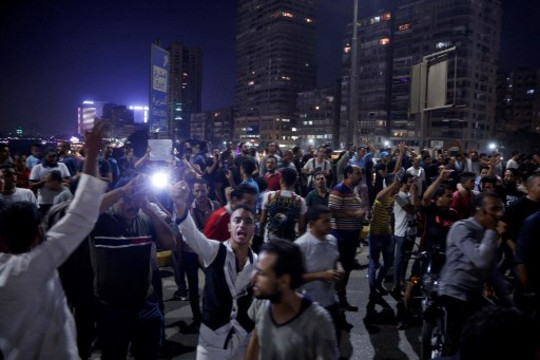Protests against President el-Sisi have spread across Egypt since they began on Friday 20 September despite a ban on public protest dating from 2013.
Reports claim that around 2000 Egyptians have been arrested. Among them were four journalists who are being held incommunicado. A number of media and social media sites have also been blocked.
Photographer Amr Hisham was also arrested on 20 September at Giza City near Cairo.
Reporter Engi Abd El Wahab was one of the first media workers to be arrested, on 20 September. She had just begun training at independent media Al-Masri Al-Youm.
Freelance photographer Sayed Abd Ellah was arrested on 22 September in Suez. He had streamed the protests in that city and discussed them on Al-Jazeera, according to a report by the broadcaster posted on Facebook.
According to the Egyptian media Mada Masr, the arts columnist Nasser Abd El Hafez was arrested on 20 September while he was taking pictures during the protests. On 25 September, he was placed in pretrial detention for allegedly supporting a banned group.
In a statement addressed to international media and their correspondents based in Cairo on 22 September, the State Information Service said that it had “carefully monitored” their reports and called upon media correspondents "to abide by Global professional standards" In particular it warned against social media which "should not be considered as sources of news or reporting as these sources".
On Monday 23rd, the military spokesperson called on all mass media outlets and citizens "not to receive news related to the military from unreliable sources on social media platforms."
The Check Point Software Technologies, a cybersecurity company, found that several cyberattacks targeted different activists, including journalists. In a report they published on October 3rd, Check Point linked these attacks to the Egyptian government.
According to Netblocks, an organization that tracks internet shutdowns, access to Twitter and Facebook messenger has become intermittent in the country. Media such as BBC Arabic website and U.S.-funded Al-hurra news have been blocked.
IFJ General Secretary Anthony Bellanger said: "We demand the swift release of our colleagues arrested for just doing their job. We call on the Egyptian authorities to immediately lift their ban on social media and let foreign and local media operate freely. Internet shutdowns damage the public's right to know including the right for people to receive and impart information. Preventing citizens from their right to know is a clear attack on democracy".

